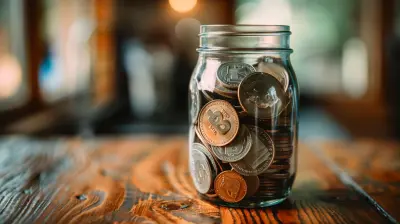How to Cultivate a Debt-Free Lifestyle with Daily Habits
2 August 2025
Let’s get real for a second—living debt-free isn't about luck or a sudden windfall. It’s about habits. The little things you do every single day. Think of it like brushing your teeth. If you do it daily, you prevent cavities. Skip it for too long… well, you know how that goes. Living without debt works the same way—it’s a lifestyle, not a one-time fix.
You're here because you want out of the paycheck-to-paycheck cycle or maybe you’re just tired of those soul-sucking credit card bills. Either way, you’re in the right place. Let's dive into how you can build a debt-free lifestyle by simply adjusting your daily habits.
Why a Debt-Free Life Rocks
Before we dive into the how, let’s talk about the why. When you're debt-free, you breathe easier. You're not waking up sweating over minimum payments or dodging bank calls. It means you're in control of your money—and not the other way around.No more living for your next paycheck.
No more giving your hard-earned cash to credit card companies.
And the best part? You get to be the boss of your financial future.
1. Get Real with Your Finances Every Morning
This might sound dramatic, but checking in with your money each day is a total game-changer. I’m not saying you need a two-hour financial analysis every morning (who has time for that?). Just a quick look.Open your banking app. Glance at your balances. Ask yourself:
- Did I spend more than I planned yesterday?
- Am I still on track with my budget?
- Any unexpected charges pop up?
Think of it like checking your rearview mirror before switching lanes. It only takes a second, but it keeps you safe and in control.
Daily Tip:
Create a habit to review your account balances over your morning coffee. Add it to your daily routine. It’ll take five minutes but save you thousands in slip-ups over time.
2. Budget Like It’s Your Best Friend
You know that dependable friend who always reminds you to bring a jacket or keeps your secrets safe? That should be your budget.A good budget gives you clarity. You know exactly what’s coming in and what’s going out. People often think of budgets as restriction tools—but think of it instead like GPS for your money. It tells you where to go so you don’t get lost in debt.
The 50/30/20 Rule (Simple and Effective):
- 50% of income → Needs (rent, groceries, bills)- 30% → Wants (dining out, Netflix, hobbies)
- 20% → Savings and Debt Repayment
Daily check-ins with your budget help you stay on the road instead of falling into spending potholes.
3. Crush Impulse Spending with a “24-Hour Rule”
We've all done it. That quick Amazon order. The "treat yo' self" moment that spirals into regret.Impulse spending is one of the fastest ways to keep yourself in debt. It’s the silent budget killer. But there’s a simple fix: the 24-hour rule.
When you feel the itch to buy something non-essential, wait 24 hours. Sleep on it. Most of the time, the urge will pass. You’ll either decide it’s not worth breaking your budget—or you’ll find a cheaper alternative.
Daily Tip:
Set a reminder on your phone whenever you add something to your cart. Give yourself a full day before hitting that “Buy Now” button.4. Meal Prep Like a Boss
You might be surprised by how much money slips through your fingers via eating out. Daily trips to the coffee shop, drive-thrus, or ordering Uber Eats all add up.Start meal prepping, even just a few meals per week. It’s like giving yourself a daily raise.
You don’t have to become a MasterChef. Keep it simple—oatmeal, sandwiches, pasta, rice bowls. Cheap, filling, and way less than eating out.
Daily Tip:
Plan your meals the night before. Even knowing what you’ll eat for lunch tomorrow can stop a spontaneous fast-food splurge.5. Use Cash (Yes, Actual Paper Money)
This one’s old-school, but it works wonders.There’s something powerful about handing over physical bills instead of swiping a card. You feel the money leaving your hands—literally. It makes you more conscious of your spending.
Try doing this with your discretionary spending (e.g., groceries, fun money). Withdraw a set amount each week, and when it’s gone, it’s gone.
Think of cash like a leash—it keeps you from running wild with your wallet.
6. Unsubscribe and Simplify
Here’s a fun challenge: go through your email inbox and unsubscribe from 10 marketing emails today. You know, the ones that tempt you with “75% off flash sale!” or “Don’t miss this limited-time offer!”Every day, these emails nudge you to spend. Cut the noise.
Also, clean up your subscriptions. Streaming services, apps, monthly boxes—if you’re not using it weekly, it’s time to cancel it.
Daily Tip:
Check one subscription or service each day. Ask: do I need this? Do I use it? Your bank account will thank you.7. Automate Your Savings and Debt Payments
Out of sight, out of mind—except in a good way.Set up automated transfers to go directly into your savings account the day you get paid. Better yet, set up automatic payments toward your debts.
This does two things:
1. You prioritize savings and debt before spending.
2. You reduce the chances of missing a payment and getting hit with late fees.
Think of automation as the lazy person’s way to be financially responsible. Set it and forget it.
8. Track Every Dollar (Even If It’s Small)
Ever realize your wallet is empty and wonder where your money went? It’s those “harmless” little purchases that sneak up on you.A $4 coffee here. A $10 lunch there. It adds up.
Start logging every dollar you spend. You can use a spreadsheet, an app, or even a notebook. Doesn’t matter—just track it.
It's like food journaling for your wallet. Annoying at first, but powerful once you see patterns. Awareness leads to control.
9. Practice Gratitude to Curb Lifestyle Creep
We live in a culture where there’s always a new phone, new car, new thing to want. But you don’t have to chase every shiny object.Daily gratitude helps you focus on what you already have. When you're grateful, you're less likely to spend money chasing happiness.
Instead of scrolling through social media and comparing yourself to that influencer’s perfect life, take five minutes each day to write down three things you’re thankful for.
It rewires your brain. You start realizing you don’t need more stuff—you just need more appreciation.
10. Read or Listen to Something Financial Daily
Five minutes a day can change your brain and your bank account.There are tons of podcasts, YouTube channels, and finance blogs (like the one you’re reading!) that dish out daily tips.
Even better? They keep your mind focused on your goal—to live debt-free. When your brain is aligned with your daily habits, that’s when the real magic happens.
11. Say “No” Without Guilt
Here’s the thing—cultivating a debt-free lifestyle sometimes means saying no. No to that dinner out, no to that weekend trip, no to going in on that group gift.It’s not that you’re being cheap. You’re being smart.
You’re putting long-term peace over short-term pleasure. And guess what? Real friends will understand.
Daily Affirmation:
Try this mantra—“I’m saying no today so I can say yes to more important things later.”12. Reflect Every Night
Finally, take a few minutes before bedtime to reflect. Ask yourself:- Did I stay on track financially today?
- What could I do better tomorrow?
- What did I do well today?
This habit builds awareness. It helps you course-correct and keeps your goal front and center. Like a coach reviewing game footage, you’ll learn more about your spending behaviors—what works, what doesn’t.
Final Thoughts: Build Wealth One Day at a Time
Living a debt-free life isn’t about magic formulas or winning the lottery. It’s about showing up daily. Kind of like going to the gym. The first day is hard. The first week might be messy. But stay consistent, and soon, it becomes second nature.Remember—every dollar you save, every impulse you resist, every smart choice you make compounds over time. That’s the power of habits.
So don’t wait for a Monday, a new month, or some perfect moment.
Start today.
Your future self will high-five you for it.
all images in this post were generated using AI tools
Category:
Financial HabitsAuthor:

Knight Barrett
Discussion
rate this article
1 comments
Robert Parker
Small changes lead to significant freedom.
August 17, 2025 at 3:54 AM

Knight Barrett
Absolutely! Small, consistent changes in daily habits can create a powerful path to financial freedom and a debt-free lifestyle.


